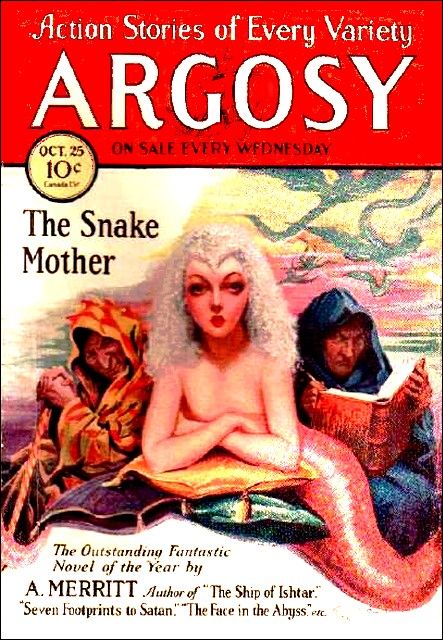 A. Merritt’s role in the development Lovecraft’s Mythos stories is well known. Indeed, “The Call of Cthulhu” is pretty much a direct answer to Merritt’s “The Moon Pool”. You hear very little about him among science fiction fans, however. Just in general, they tend to look back on John Campbell’s work as more or less being the birth of the field. But if you’d like to understand just precisely how that style of fiction came to be, I can suggest the following chain of influences as something worth looking into: from Francis Stevens to A. Merritt to Jack Williamson to Isaac Asimov.
A. Merritt’s role in the development Lovecraft’s Mythos stories is well known. Indeed, “The Call of Cthulhu” is pretty much a direct answer to Merritt’s “The Moon Pool”. You hear very little about him among science fiction fans, however. Just in general, they tend to look back on John Campbell’s work as more or less being the birth of the field. But if you’d like to understand just precisely how that style of fiction came to be, I can suggest the following chain of influences as something worth looking into: from Francis Stevens to A. Merritt to Jack Williamson to Isaac Asimov.
While I’m surprised at just how obscure A. Merritt has become at this point, I nevertheless have to point out that if you allow him to be dropped from peoples’ mental maps of the “weird” fiction landscape, you lose an opportunity to discuss the author that has been called the most gifted women writer of science fantasy between Mary Wollstonecraft Shelley and C.L. Moore. So if you needed it, there’s one more reason to keep A. Merritt in rotation.
Here is a survey of what can currently be found on the internet about A. Merritt:
Grognardia — “Even so, I don’t think that fully explains why Merritt is so poorly known and appreciated in the 21st century. The real answer, I think, lies in his stories, which don’t fall into neat, easily marketable categories. Whereas Lovecraft can be crudely called a ‘horror’ writer and Howard a ‘fantasy’ one, Merritt defies such facile classification. More often than not, his stories feature recognizably ‘pulp’ heroes — men of action and intelligence equally adept at problem-solving and fisticuffs — but Merritt’s style is ornate, even florid, marshaling a veritable army of adjectives, adverbs, and archaisms to describe scenes of remarkable power.”
Cirsova — “Imagine, if you can, a Lovecraft who wrote about dashing heroes and beautiful, mysterious heroines. Imagine a pulp story and plot written by one of the English greats of the former centuries. It looks like silly sci-fi trash but reads like very little you’d find outside of collegiate lit courses.”
KIRKUS — “In many ways, Merritt, along with other pulp-era authors such as Francis Stevens and Edgar Rice Burroughs, helped to establish the tone and expectations for much of what was to come from the genre: readers could imagine that the stories they were reading could take place…. Merritt was one major author who helped to reinforce and set expectations for what a science-fiction story should be: realistic characters in a plausible world facing off against extraordinary situations that keep readers coming back week after week.”
Tor.com — “The Madonna/Whore dichotomy could not be clearer. I mean, wow. While the two women of the story—apart from a few sex slaves, which, ew—make a lot of noises about being dangerous, with their ray guns and poisonous flowers, in the clutch of things they are, you know, overcome by raw masculine energy or some such rot. Not to mention the usual swath of civilized white people, savage brown people, and magical super white people. Not a fan of that, either. Still, I think you can be critical of something you like; in fact I would say it is crucial to be critical of things you like!”
Black Gate — “A. Merritt is something of a cautionary tale for authors today. He was the bestselling American fantasy writer for a generation. His career spanned three decades, from 1917 to the mid-1940s, and his novels — including The Moon Pool (1919), The Ship of Ishtar (1924), The Face in the Abyss (1931), and Creep, Shadow! (1934) — remained in print for more than seven decades after his death. Yet he is virtually forgotten today. This isn’t a case of an uncaring public ignoring a forgotten genius. Merritt certainly still has his fans, but his day is past. Personally, I find his novels largely unreadable. His short stories, however, are another matter.”
I fail to see how Merritt is a cautionary tale.
“Be careful, 70 years after your death people on the internet may think you should’ve gotten with the times.”
Other giants like Burroughs, Howard, Lovecraft, are really only known to most by their Characters, not their actual works like Tarzan, Conan, Cthulhu.
I submit that most people have never read the original works, but only pastiches, or have encountered the character through cultural osmosis. If Merritt had such a Character, he might be remembered today as well.
To be clearer – Tarzan, Conan, Cthulhu are the Characters.
The part I really find sad is that so many of what today passes as “literary critics” base their criticism, not on the actual merits of the author’s works (pun intended), but rather on the color of their skin, the nature of their genitalia, and whether or not they can be neatly slotted into the critic’s own interpretation of society. People, authors no less than the rest of us, are a product of their times. It’s rare indeed to find one who can rise above the cultural norms of their time and place. One is forced to wonder how well most of today’s self-proclaimed “literary giants” will stack up in 70 years. Somehow, I don’t think A. Merritt or HPL, or REH have too much to worry about…